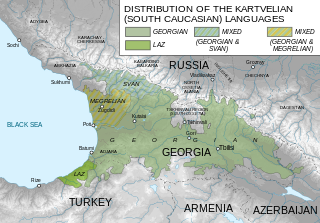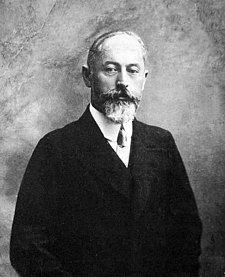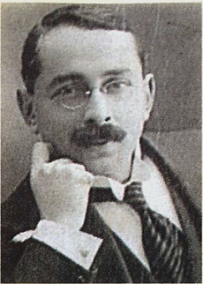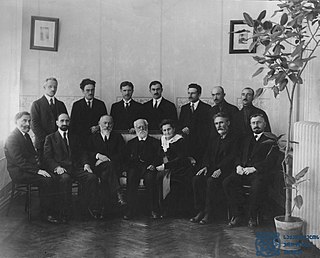This article needs additional citations for verification .(January 2013) (Learn how and when to remove this template message) |
Leo Kereselidze (Georgian :ლეო კერესელიძე) (1885 – 1944) was a Georgian military figure, politician and journalist involved in the Georgian national movement against the Russian and later Soviet domination.

Georgian is a Kartvelian language spoken by Georgians. It is the official language of Georgia. Georgian is written in its own writing system, the Georgian script. Georgian is the literary language for all regional subgroups of Georgians, including those who speak other Kartvelian languages: Svans, Mingrelians and the Laz.

Georgia is a country in the Caucasus region of Eurasia. Located at the crossroads of Western Asia and Eastern Europe, it is bounded to the west by the Black Sea, to the north by Russia, to the south by Turkey and Armenia, and to the southeast by Azerbaijan. The capital and largest city is Tbilisi. Georgia covers a territory of 69,700 square kilometres (26,911 sq mi), and its 2017 population is about 3.718 million. Georgia is a unitary semi-presidential republic, with the government elected through a representative democracy.

The Russian Empire, also known as Imperial Russia or simply Russia, was an empire that existed across Eurasia and North America from 1721, following the end of the Great Northern War, until the Republic was proclaimed by the Provisional Government that took power after the February Revolution of 1917.
Early in his twenties, Keresselidze was involved in the Russian Revolution of 1905 and took part in attacks against Russian officials and military as well as in the running of a cargo of guns to the port of Sukhum-Kale. He subsequently moved to Western Europe and obtained a Ph.D. degree from the University of Geneva. In 1913, he joined a group of Georgian patriots in the Committee of Independent Georgia, and engaged in journalism, co-editing with his brother Georges Keresselidze a Geneva-based Georgian newspaper Tavisupali Sakartvelo (“Free Georgia”) from 1913 to 1914, and then working for a Berlin-based Kartuli Gazeti (“Georgian Newspaper”) from 1916 to 1918. In 1914, at the eve of World War I, the Committee moved to Germany and sought the German aid in restoring the independence of Georgia from Russia. Keresselidze led a military unit of Georgian volunteers, the Georgian Legion, which fought on the German side and was transferred to the Ottoman-Russian Caucasus front. Keresselidze tried to negotiate an alliance with the Ottoman Empire, but refused to accept its suzerainty over a potentially independent Georgia. [1] He was subsequently promoted to major general, but the Legion was disbanded due to his disagreement with the Ottoman government. Keresselidze was then involved in diplomacy between Georgians and Germans, and staging subversions against the Russian troops. After the collapse of the Russian armies in the Caucasus and the proclamation of Georgian independence in May 1918, Keresselidze was able to his own country and helped create national army divisions. The 1921 Red Army invasion of Georgia forced him into exile to Germany where he was among the founding members and a secretary general of the right-leaning nationalist organization Tetri Giorgi. Not long before his death, he helped establish a new political organization of Georgian émigrés, the Union of Georgian Traditionalists.

Sukhumi or Sokhumi is a city on the Black Sea coast. It is the capital of the breakaway Republic of Abkhazia which has controlled it since the 1992-93 war in Abkhazia, although most of the international community considers it legally part of Georgia.

Western Europe is the region comprising the western part of Europe. Though the term Western Europe is commonly used, there is no commonly agreed-upon definition of the countries that it encompasses.

The University of Geneva is a public research university located in Geneva, Switzerland.
Keresselidze's revolutionary career is the subject of a fictionalized biography Unending Battle (London, 1934) by the British army officer and writer Harold Courtenay Armstrong (1891–1943). [2]

The United Kingdom (UK), officially the United Kingdom of Great Britain and Northern Ireland, and sometimes referred to as Britain, is a sovereign country located off the north-western coast of the European mainland. The United Kingdom includes the island of Great Britain, the north-eastern part of the island of Ireland, and many smaller islands. Northern Ireland is the only part of the United Kingdom that shares a land border with another sovereign state, the Republic of Ireland. Apart from this land border, the United Kingdom is surrounded by the Atlantic Ocean, with the North Sea to the east, the English Channel to the south and the Celtic Sea to the south-west, giving it the 12th-longest coastline in the world. The Irish Sea lies between Great Britain and Ireland. With an area of 242,500 square kilometres (93,600 sq mi), the United Kingdom is the 78th-largest sovereign state in the world. It is also the 22nd-most populous country, with an estimated 66.0 million inhabitants in 2017.

















